(2001) The Bonesetter's Daughter Read online
The Bonesetter’s Daughter
Amy Tan
Table of Contents
* * *
I give endless thanks to my dear friend and editor, the late, great Faith Sale. To my astonishment, she could always sense the difference between what I was trying to write and what I wanted to write. She promised she would see me through this book, and though she died before I finished, I believe she kept her promise.
My writing teacher and longtime mentor, Molly Giles, took over as editor and resurrected this book during those days when I was scared to turn the pages. Thank you, Molly, for your keen eye and ear, as well as for suggestions that were always true to my intentions. I also much appreciated the heavy doses of optimism during times we can now acknowledge as dire.
I am blessed to have had the help, kindness, and protection of Lou and Greg, the guidance of Sandra Dijkstra, Anna Jardine, and Aimee Taub, and the spiritual sustenance of the late-night posters on AOL’s Caregivers’ Support for the Elderly.
As luck and fate would have it, two ghostwriters came to my assistance during the last draft. The heart of this story belongs to my grandmother, its voice to my mother. I give them credit for anything good, and have already promised them I will try harder the next time.
* * *
On the last day that my mother spent on earth,
I learned her real name, as well as that of my grandmother.
This book is dedicated to them.
Li Bingzi
and Gu Jingmei
* * *
TRUTH
These are the things I know are true:
My name is LuLing Liu Young. The names of my husbands were Pan Kai Jing and Edwin Young, both of them dead and our secrets gone with them. My daughter is Ruth Luyi Young. She was born in a Water Dragon Year and I in a Fire Dragon Year. So we are the same but for opposite reasons.
I know all this, yet there is one name I cannot remember. It is there in the oldest layer of my memory, and I cannot dig it out. A hundred times I have gone over that morning when Precious Auntie wrote it down. I was only six then, but very smart. I could count. I could read. I had a memory for everything, and here is my memory of that winter morning.
I was sleepy, still lying on the brick k’ang bed I shared with Precious Auntie. The flue to our little room was furthest from the stove in the common room, and the bricks beneath me had long turned cold. I felt my shoulder being shaken. When I opened my eyes. Precious Auntie began to write on a scrap of paper, then showed me what she had written. “I can’t see,” I complained. “It’s too dark.”
She huffed, set the paper on the low cupboard, and motioned that I should get up. She lighted the teapot brazier, and tied a scarf over her nose and mouth when it started to smoke. She poured face-washing water into the teapot’s chamber, and when it was cooked, she started our day. She scrubbed my face and ears. She parted my hair and combed my bangs. She wet down any strands that stuck out like spider legs. Then she gathered the long part of my hair into two bundles and braided them. She banded the top with red ribbon, the bottom with green. I wagged my head so that my braids swung like the happy ears of palace dogs. And Precious Auntie sniffed the air as it she, too, were a dog wondering. What’s that good smell? That sniff was how she said my nickname, Doggie. That was how she talked.
She had no voice, just gasps and wheezes, the snorts of a ragged wind. She told me things with grimaces and groans, dancing eyebrows and darting eyes. She wrote about the world on my carry-around chalkboard. She also made pictures with her blackened hands. Hand-talk, face-talk, and chalk-talk were the languages I grew up with, soundless and strong.
As she wound her hair tight against her skull, I played with her box of treasures. I took out a pretty comb, ivory with a rooster carved at each end. Precious Auntie was born a Rooster. “You wear this,” I demanded, holding it up. “Pretty.” I was still young enough to believe that beauty came from things, and I wanted Mother to favor her more. But Precious Auntie shook her head. She pulled off her scarf and pointed to her face and bunched her brows. What use do I have for prettiness ? she was saying.
Her bangs fell to her eyebrows like mine. The rest of her hair was bound into a knot and stabbed together with a silver prong. She had a sweet-peach forehead, wide-set eyes, full cheeks tapering to a small plump nose. That was the top of her face. Then there was the bottom.
She wiggled her blackened fingertips like hungry flames. See what the fire did.
I didn’t think she was ugly, not in the way others in our family did. “Ai-ya, seeing her, even a demon would leap out of his skin,” I once heard Mother remark. When I was small, I liked to trace my fingers around Precious Auntie’s mouth. It was a puzzle. Half was bumpy, half was smooth and melted closed. The inside of her right cheek was stiff as leather, the left was moist and soft. Where the gums had burned, the teeth had fallen out. And her tongue was like a parched root. She could not taste the pleasures of life: salty and bitter, sour and sharp, spicy, sweet, and fat.
No one else understood Precious Auntie’s kind of talk, so I had to say aloud what she meant. Not everything, though, not our secret stories. She often told me about her father, the Famous Bonesetter from the Mouth of the Mountain, about the cave where they found the dragon bones, how the bones were divine and could cure any pain, except a grieving heart. “Tell me again,” I said that morning, wishing for a story about how she burned her face and became my nursemaid.
I was a fire-eater, she said with her hands and eyes. Hundreds of people came to see me in the market square. Into the burning pot of my mouth I dropped raw pork, added chilis and bean paste, stirred this up, then offered the morsels to people to taste. If they said, “Delicious!” I opened my mouth as a purse to catch their copper coins. One day, however, I ate the fire, and the fire came back, and it ate me. After that, I decided not to be a cook-pot anymore, so I became your nursemaid instead.
I laughed and clapped my hands, liking this made-up story best. The day before, she told me she had stared at an unlucky star falling out of the sky and then it dropped into her open mouth and burned her face. The day before that, she said she had eaten what she thought was a spicy Hunan dish only to find that it was the coals used tor cooking.
No more stories. Precious Auntie now told me, her hands talking fast. It’s almost time for breakfast, ana we must pray while we’re still hungry. She retrieved the scrap of paper from the cupboard, folded it in half, and tucked it into the lining of her shoe. We put on our padded winter clothes and walked into the cold corridor. The air smelled of coal fires in other wings of the compound. I saw Old Cook pumping his arm to turn the crank over the well. I heard a tenant yelling at her lazy daughter-in-law. I passed the room that my sister, GaoLing, shared with Mother, the two of them still asleep. We hurried to the south-facing small room, to our ancestral hall. At the threshold, Precious Auntie gave me a warning look. Act humble. Take off your shoes. In my stockings, I stepped onto cold gray tiles. Instantly, my feet were stabbed with an iciness that ran up my legs, through my body, and dripped out my nose. I began to shake.
The wall facing me was lined with overlapping scrolls of couplets, gifts to our family from scholars who had used our ink over the last two hundred years. I had learned to read one, a poem-painting: “Fish shadows dart downstream,” meaning our ink was dark, beautiful, and smooth-flowing. On the long altar table were two statues, the God of Longevity with his white-waterfall beard, and the Goddess of Mercy, her face smooth, free of worry. Her black eyes looked into mine. Only she listened to the woes and wishes of women, Precious Auntie said. Perched around the statues were spirit tablets of the Liu ancestors, their wooden faces carved with their names. Not all my ancestors were ther
e, Precious Auntie told me, just the ones my family considered most important. The in-between ones and those belonging to women were stuck in trunks or forgotten.
Precious Auntie lighted several joss sticks. She blew on them until they began to smolder. Soon more smoke rose—a jumble of our breath, our offerings, and hazy clouds that I thought were ghosts who would try to yank me down to wander with them in the World of Yin. Precious Auntie once told me that a body grows cold when it is dead. And since I was chilled to the bone that morning, I was afraid.
“I’m cold,” I whimpered, and tears leaked out.
Precious Auntie sat on a stool and drew me to her lap. Stop that, Doggie, she gently scolded, or the tears will freeze into icicles and poke out your eyes. She kneaded my feet fast, as if they were dumpling dough. Better? How about now, better?
After I stopped crying, Precious Auntie lighted more joss sticks. She went back to the threshold and picked up one of her shoes. I can still see it—the dusty blue cloth, the black piping, the tiny embroidery of an extra leaf where she had repaired the hole. I thought she was going to burn her shoe as a send-away gift to the dead. Instead, from the shoe’s lining, she took out the scrap of paper with the writing she had showed me earlier. She nodded toward me and said with her hands: My family name, the name of all the bonesetters. She put the paper name in front of my face again and said, Never forget this name, then placed it carefully on the altar. We bowed and rose, bowed and rose. Each time my head bobbed up, I looked at that name. And the name was—
Why can’t I see it now? I’ve pushed a hundred family names through my mouth, and none comes back with the belch of memory. Was the name uncommon? Did I lose it because I kept it a secret too long? Maybe I lost it the same way I lost all my favorite things—the jacket GaoLing gave me when I left for the orphan school, the dress my second husband said made me look like a movie star, the first baby dress that Luyi outgrew. Each time I loved something with a special ache, I put it in my trunk of best things. I hid those things for so long I almost forgot I had them.
This morning I remembered the trunk. I went to put away the birthday present that Luyi gave me. Gray pearls from Hawaii, beautiful beyond belief. When I opened the lid, out rose a cloud of moths, a stream of silverfish. Inside I found a web of knitted holes, one after the other. The embroidered flowers, the bright colors, now gone. Almost all that mattered in my life has disappeared, and the worst is losing Precious Auntie’s name.
Precious Auntie, what is our name? I always meant to claim it as my own. Come help me remember. I’m not a little girl anymore. I’m not afraid of ghosts. Are you still mad at me? Don’t you recognize me? I am LuLing, your daughter.
PART ONE
ONE
For the past eight years, always starting on August twelfth, Ruth Young lost her voice.
The first time it happened was when she moved into Art’s flat in San Francisco. For several days, Ruth could only hiss like an untended teakettle. She figured it was a virus, or perhaps allergies to a particular mold in the building.
When she lost her voice again, it was on their first anniversary of living together, and Art joked that her laryngitis must be psychosomatic. Ruth wondered whether it was. When she was a child, she lost her voice after breaking her arm. Why was that? On their second anniversary, she and Art were stargazing in the Grand Tetons. According to a park pamphlet, “During the peak of the Perseids, around August 12th, hundreds of ‘shooting’ or ‘falling’ stars streak the sky every hour. They are actually fragments of meteors penetrating the earth’s atmosphere, burning up in their descent.” Against the velvet blackness, Ruth silently admired the light show with Art. She did not actually believe that her laryngitis was star-crossed, or that the meteor shower had anything to do with her inability to speak. Her mother, though, had often told Ruth throughout her childhood that shooting stars were really “melting ghost bodies” and it was bad luck to see them. If you did, that meant a ghost was trying to talkto you. To her mother, just about anything was a sign of ghosts: broken bowls, barking dogs, phone calls with only silence or heavy breathing at the other end.
The following August, rather than just wait for muteness to strike, Ruth explained to her clients and friends that she was taking a planned weeklong retreat into verbal silence. “It’s a yearly ritual,” she said, “to sharpen my consciousness about words and their necessity.” One of her book clients, a New Age psychotherapist, saw voluntary silence as a “wonderful process.” and decided he would engage in the same so they could include their findings in a chapter on either dysfunctional family dynamics or stillness as therapy.
From then on, Ruth’s malady was elevated to an annual sanctioned event. She stopped talking two days before her voice faded of its own accord. She politely declined Art’s offer that they both try speaking in sign language. She made her voiceless state a decision, a matter of will, and not a disease or a mystery. In fact, she came to enjoy her respite from talk; for a whole week she did not need to console clients, remind Art about social schedules, warn his daughters to be careful, or feel guilty for not calling her mother.
This was the ninth year. Ruth, Art, and the girls had driven the two hundred miles to Lake Tahoe for the Days of No Talk, as they called them. Ruth had envisioned the four of them holding hands and walking down to the Truckee River to watch the nightly meteor showers in quiet awe. But the mosquitoes were working overtime, and Dory whimpered that she saw a bat, to which Fia teased, “Who cares about rabies when the forest is full of ax murderers?” After they fled back to the cabin, the girls said they were bored. “There’s no cable television?” they complained. So Art drove them to Tahoe City and rented videos, mainly horror flicks. He and the girls slept through most of them, and though Ruth hated the movies, she could not stop watching. She dreamed of deranged babysitters and oozing aliens.
On Sunday, when they returned home to San Francisco, cranky and sweaty, they discovered they had no hot water. The tank had leaked, and the heating element apparently had fried to death. They were forced to make do with kettle-warmed baths; Art didn’t want to be gouged by emergency plumbing rates. Without a voice, Ruth couldn’t argue, and she was glad. To argue would mean she was offering to foot the bill, something she had done so often over their years of living together that it had become expected of her. But because she did not offer, she felt petty, then irked that Ark said nothing further about the matter. At bedtime he nuzzled her neck and bumped gently into her backside. When she tensed, he said, “Suit yourself,” and rolled over, and this left her feeling rebuffed. She wanted to explain what was wrong—but she realized she did not know. There was nothing specific beyond her bad mood. Soon Art’s sonorous breathing rumbled out of sync with her frustration, and she lay wide-eyed in the dark.
It was now nearly midnight, and in another few hours, Ruth would be able to talk. She stood in the Cubbyhole, a former pantry that served as her home office. She stepped onto a footstool and pushed open a tiny window. There it was, a sliver of a million-dollar view: the red towers of the Golden Gate Bridge that bifurcated the waters, marking bay from ocean. The air was moist and antiseptically cold against her face. She scanned the sky, but it was too light and misty to see any “ghost bodies” burning up. Foghorns started to blare. And after another minute, Ruth saw the billows, like an ethereal down comforter covering the ocean and edging toward the bridge. Her mother used to tell her that the fog was really the steam from fighting dragons, one water, the other fire. “Water and fire, come together make steam,” LuLing would say in the strangely British-accented English she had acquired in Hong Kong. “You know this. Just like teapot. You touch, burn you finger off.”
The fog was sweeping over the ramparts of the bridge, devouring the headlamps of cars. Nine out of ten drivers were drunk at this hour—Ruth had read that somewhere. Or maybe she had written that for a client. She stepped down, but left the window open.
The foghorns continued to wail. They sounded like tubas in a Shostakovich opera, c
omedically tragic. But was tragedy ever funny? Or was it only the audience who laughed knowingly as the victims walked into trapdoors and trick mirrors?
Still wide awake, Ruth turned to her desk. Just then she felt a tug of worry, something she was not supposed to forget. Did it have to do with money, a client, or a promise she had made to the girls? She set to straightening her desk, aligning her research books, sorting faxes and drafts, color-coding them according to client and book. Tomorrow she had to return to routine and deadlines, and a clean desk gave her the sense of a fresh start, an uncluttered mind. Everything had its place. If an item was of questionable priority or value, she dumped it in the bottom right-hand drawer of her desk. But now the drawer was full with unanswered letters, abandoned drafts, sheets of jotted-down ideas that might be usable in the future. She pulled out a clipped stack of paper from the bottom of the drawer, guessing she could toss out whatever had lain there the longest by neglect.
They were pages written in Chinese, her mother’s writing. LuLing had given them to her five or six years before. “Just some old things about my family,” she had said, with the kind of awkward nonchalance that meant the pages were important. “My story, begin little-girl time. I write for myself, but maybe you read, then you see how I grow up, come to this country.” Ruth had heard bits of her mother’s life over the years, but she was touched by her shyness in asking Ruth to read what she had obviously labored over. The pages contained precise vertical rows, without cross-outs, leaving Ruth to surmise that her mother had copied over her earlier attempts.
Ruth had tried to decipher the pages. Her mother had once drilled Chinese calligraphy into her reluctant brain, and she still recognized some of the characters: “thing,” “I,” “truth.” But unraveling the rest required her to match LuLing’s squiggly radicals to uniform ones in a Chinese-English dictionary. “These are the things I know are true,” the first sentence read. That had taken Ruth an hour to translate. She set a goal to decipher a sentence a day. And in keeping with her plan, she translated another sentence the next evening: “My name is LuLing Liu Young.” That was easy, a mere five minutes. Then came the names of LuLing’s husbands, one of whom was Ruth’s father. Husbands? Ruth was startled to read that there had been another. And what did her mother mean by “our secrets gone with them”? Ruth wanted to know right away, but she could not ask her mother. She knew from experience what happened whenever she asked her mother to render Chinese characters into English. First LuLing scolded her for not studying Chinese hard enough when she was little. And then, to untangle each character, her mother took side routes to her past, going into excruciating detail over the infinite meanings of Chinese words: “Secret not just mean cannot say. Can be hurt-you kinda secret, or curse-you kind, maybe do you damage forever, never can change after that… .” And then came rambling about who told the secret, without saying what the secret itself was, followed by more rambling about how the person had died horribly, why this had happened, how it could have been avoided, if only such-and-such had not occurred a thousand years before. If Ruth showed impatience in listening to any of this, LuLing became outraged, before sputtering an oath that none of this mattered because soon she too would die anyway, by accident, because of bad-luck wishes, or on purpose. And then the silent treatment began, a punishment that lasted for days or weeks, until Ruth broke down first and said she was sorry.

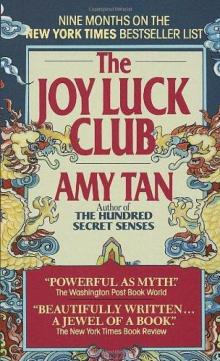 The Joy Luck Club
The Joy Luck Club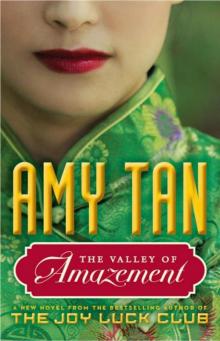 The Valley of Amazement
The Valley of Amazement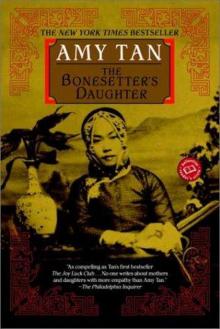 The Bonesetter's Daughter
The Bonesetter's Daughter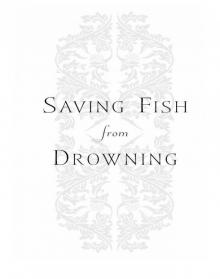 Saving Fish From Drowning
Saving Fish From Drowning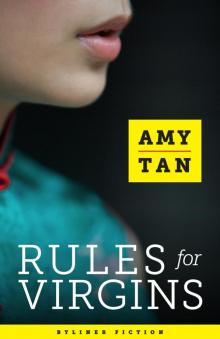 Rules for Virgins
Rules for Virgins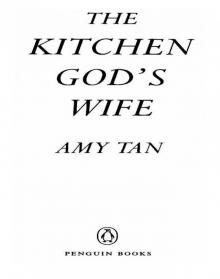 The Kitchen God's Wife
The Kitchen God's Wife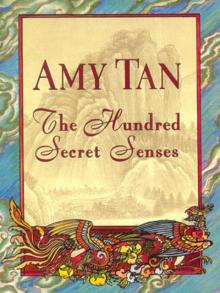 The Hundred Secret Senses
The Hundred Secret Senses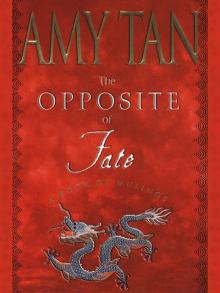 The Opposite of Fate: Memories of a Writing Life
The Opposite of Fate: Memories of a Writing Life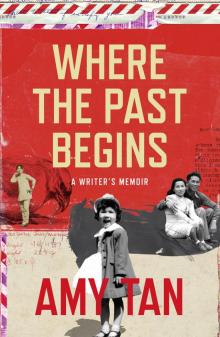 Where the Past Begins
Where the Past Begins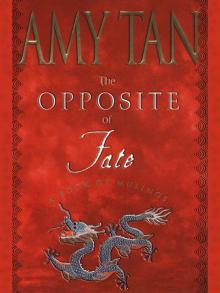 The Opposite of Fate
The Opposite of Fate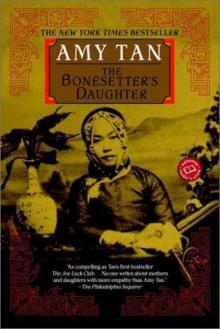 (2001) The Bonesetter's Daughter
(2001) The Bonesetter's Daughter